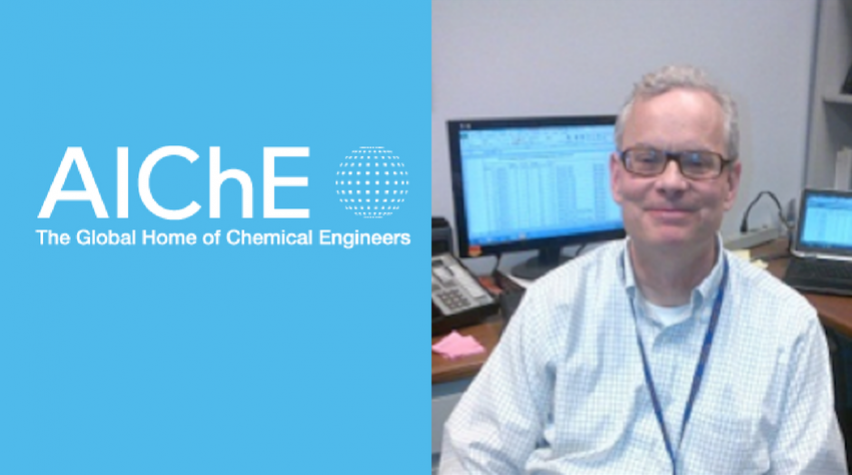
Welcome to the sixth in a series of AIChE blog posts profiling process engineers, a diverse group of professionals spanning multiple industries and regions. In this series, we aim to profile process engineers who work in fields as diverse as petrochemicals, pharma, bulk chemicals, food, and any process-intensive industry.
Are you a member and process engineer interested in being profiled? We'd love to hear from you via this volunteer opportunity. Also, we hope to build an online discussion group specifically for process engineers. You can find out about both of these initiatives and join our efforts by visiting https://www.aiche.org/processengineering
For our sixth profile, we meet process engineer Denis Fallon. Below, he talks about his work in process technology at Celanese Corp., overcoming challenges throughout his career, and the importance of his work.
Tell us a bit about your work as a process engineer.
I was fortunate to have worked with a broad range of technologies. I joined my first company in 1979, which produced phosphate fertilizers. We had both the mine and chemical complex producing over 1 million tons of product per year. I was a process engineer for the tank farm, water treatment, and later sulfuric acid manufacturing.
My responsibilities included process optimization and troubleshooting. I initiated, developed, and implemented multiple major cost-reduction projects. I provided support for multiple plant expansions and startups. Unit operations included clarification, mixing, refrigeration, boilers and steam systems, precipitation, catalysis, and absorption.
In 1988, I joined Celanese, a major cellulose acetate manufacturer. I started as a production engineer and later became a process engineer in acetic anhydride manufacturing and acetic acid recovery. Unlike my first company, Celanese introduced me to organic chemical manufacturing.
Having an assigned mentor greatly helps a new engineer learn the organization, process, and areas for personal development.
At Celanese, my duties included process optimization and troubleshooting. Unit operations included distillation, liquid-liquid extraction, evaporation, filtration, and plug flow reactors. I became the lead process simulation expert for our CA business and led major environmental projects such as replacing the process solvent.
After four years, I decided to pursue a technical career path and joined R&D, where I continued to be a lead process expert for manufacturing. I led center-of-excellence teams that included six sites sharing best practices and driving productivity savings. I also provided technical support for other sites while at the same time developing the process design for our Joint venture in Nantong, China.
I was in China for four months for the first CA plant startup. This included five subsequent expansions in Nantong. I provided process designs for new products and new applications, as well as step change improvement process technology. I participated in multiple cross-business technical projects, giving rise to my current role leading process technology for the global business.
Why did you become a process engineer?
Before college I was not aware of the engineering field. I enjoyed math and chemistry. I became interested in engineering after attending NC State University. I enjoyed the manufacturing environment and designing process equipment. This includes problem solving and optimizing a process. I enjoyed the day-to-day responsibilities of a process engineer and solving problems.
What are some of the biggest challenges you face in your role as a process engineer?
Starting out learning the process is a major challenge. Some activities that helped me included going on shift for several weeks and working with operators, and tracing out the process piping. Having an assigned mentor greatly helps a new engineer learn the organization, process, and areas for personal development.
Engineers can decide whether they want to go into management or be an individual contributor. Desirable companies recognize and reward engineers who wish to pursue management or stay on a technical career path. Another challenge is balancing time given to short-term "fire fighting" and long-term improvement. Achieving stable operation frequently requires solving fundamental problems.
How is your work as a process engineer critical to your particular job assignment or industry?
My process engineering experience gave me a practical perspective that I would not have otherwise.
Having this experience helps me better scope requirements for new new projects, reduce costs, install step change process technology, and make new products. It instilled a better teamwork mentality in me after working with many folks at the plant.
What do you think is most important about what you do as a process engineer?
Process engineers are critical to getting the product out the door. They help prevent and solve day-to-day problems, including production rate, quality, environmental and safety issues.
They are at the front line so they must track and address critical process parameters. They also have keen insights to make incremental improvements in these areas.
In addition, process engineers, like other professions, rely on teamwork and being able to get along with and respect others. It means taking initiative and having a sense of urgency. This is much more important than raw technical skills and can impact future promotions.
Connect with Denis on AIChE Engage
Join the Community of Process Engineers
The Community of Process Engineers is brought to you by Scott & Karen Love. Their support enables the AIChE Foundation to advance process engineers at every stage of their career allowing them to Do a World of Good.
AIChE Foundation – Doing a World of Good Campaign



